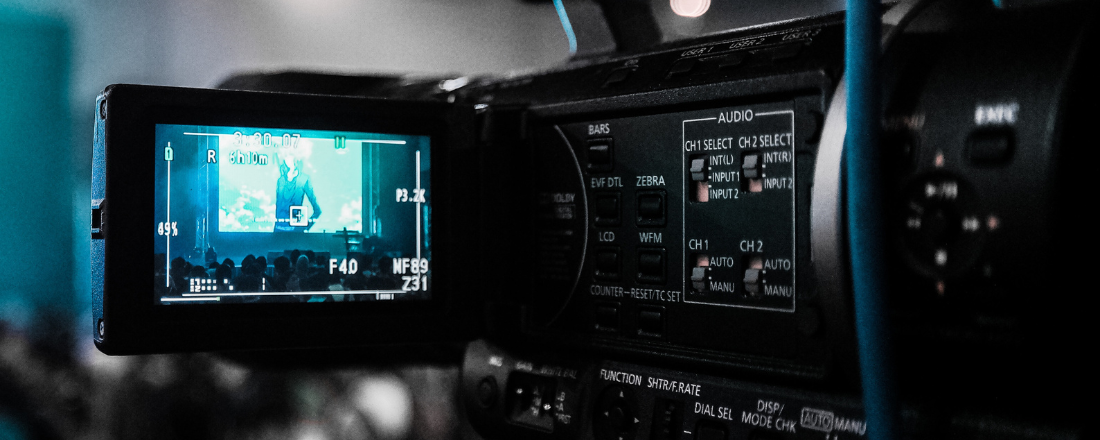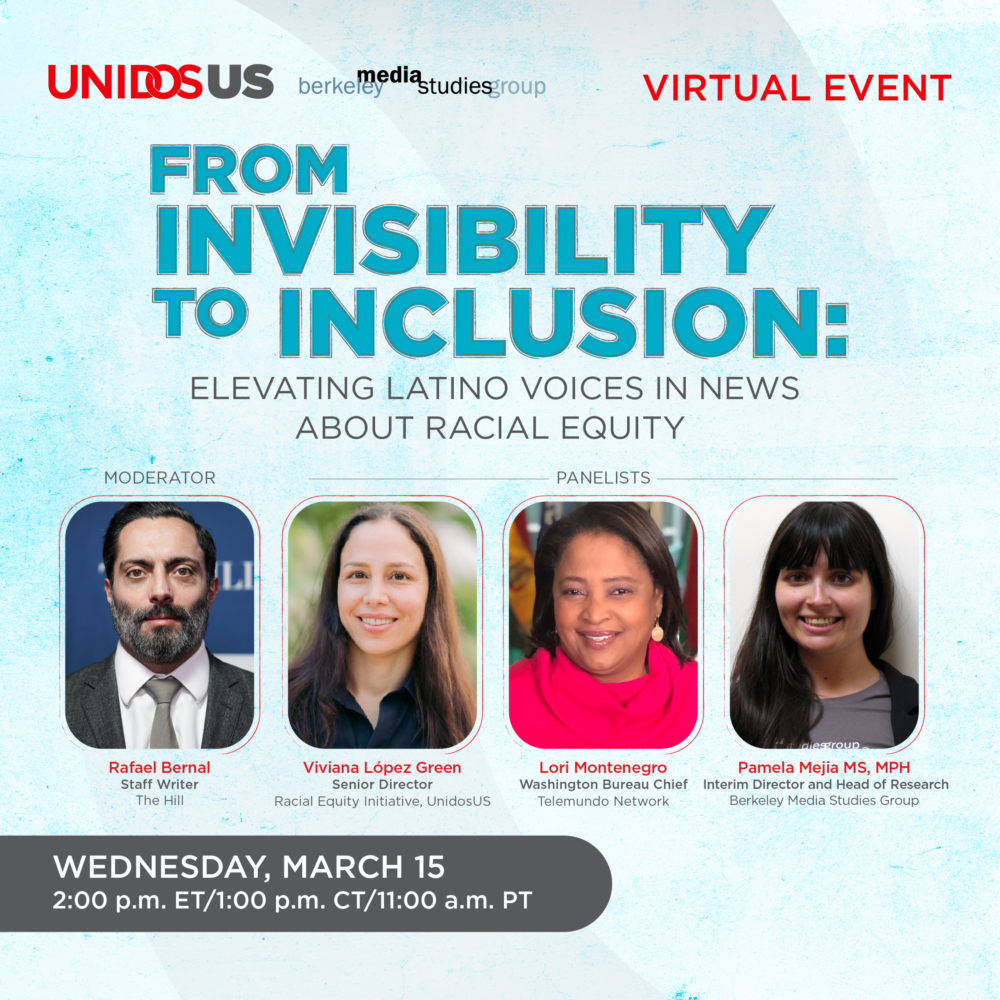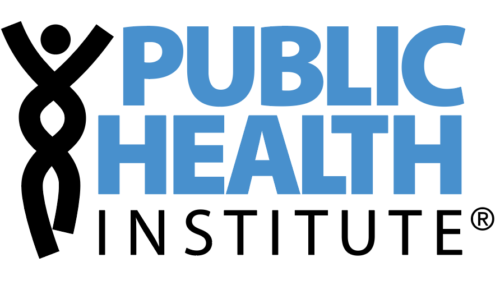
Press Release
Latinos are Underrepresented in News About Racial Equity, New Study Shows
-
Expertise
Research – Quantitative -
Programs
Berkeley Media Studies Group

Latino communities and leaders have been at the forefront of organizing around racial justice for decades, but new research suggests their perspectives and voices are barely visible in the surging public discourse around racial equity and systemic racism. A study conducted by the Berkeley Media Studies Group (a program of the Public Health Institute) in collaboration with UnidosUS, revealed that less than 6% of news about racism and racial equity referenced Latinos, who constitute nearly 20% of all Americans and over 40% of all people of color in the U.S.
The new report, “Elevating Latino Experiences and Voices in News about Racial Equity: Findings and Recommendations for More Complete Coverage” notes that this lack of representation persisted across all regions, even in California, where nearly a quarter of all U.S.-based Latinos live. Additionally, only 14% of articles quoted sources who self-identified as Latino; Latino organizations rarely appeared in coverage; and researchers found no authors who self-identified as Latino, while only about 15% of authors could be identified as Latino using contextual information, like surnames.
“These findings are disappointing but not surprising,” said Pamela Mejia, head of research at BMSG. “We know that Latinos are underrepresented in newsrooms — in fact, only 11% of news analysts, reporters, and journalists are Latino, according to the U.S. Government Accountability Office. When newsrooms don’t reflect the communities they represent, we expect the coverage to also be incomplete.”
“When Latino experiences, contributions, and concerns are excluded from news coverage, policymakers and the public don’t have the facts needed to craft effective and inclusive solutions,” said Viviana Lopez Green, senior director for UnidosUS’ Racial Equity Initiative. “Too often, our community is ‘out of sight-out of mind.’”
The report also raises concerns about how coverage is framed. Specifically, stories about racial equity issues facing Latinos tended to focus mostly on problems, while journalists discussed solutions in less than 40% of articles.
“When the news focuses only on problems without also exploring solutions, people — including policymakers — have a harder time envisioning next steps,” Mejia said. “Readers need to see the work that organizers and advocates are doing to improve their communities. Those are the kinds of stories that encourage action and instill hope.”

Listen: From Invisibility to Inclusion: Elevating Latino Voices in News about Racial Equity
In a previously recorded webinar, UnidosUS and PHI's Berkeley Media Studies Group explore findings that show the Latino voice and experience in news about racial equity have been largely left out of the news cycle. Learn more about the presence and absence of Hispanics in coverage of racial equity issues, both as sources in stories and as news creators. Speakers will examine the steps advocates, journalists and newsroom leadership can take to ensure more nuanced, inclusive and accurate coverage of racial equity issues in our multiracial society.
One way to improve coverage is by including more Latino sources who can share their firsthand experiences. The news analysis found those voices to be lacking, with only one-third of articles including people (from any racial or ethnic background) who could speak about an issue from lived experience. Meanwhile, government officials were quoted in three-quarters of coverage.
“We know change is possible,” Green said. “Journalists, publishers, advocates, and philanthropists can all play a role. Journalists should rethink the questions they ask and sources they speak to; publishers must reexamine hiring and recruiting practices; advocates can build stronger relationships with local outlets; and philanthropy ought to provide support for Latino organizations and scholars and help them forge connections with the media to tell their stories. Together, we can create a more inclusive narrative.”
To learn more about the findings and to read our full set of recommendations for improving coverage, visit https://www.bmsg.org/racial-equity-news.
About Berkeley Media Studies Group (BMSG)
Berkeley Media Studies Group, a program of the Public Health Institute, was founded in 1993 and is dedicated to expanding the ability of public health professionals, journalists, and community groups to improve the systems and structures that determine health and safety. Our approach is grounded in three decades of examining — and working to shift — narratives around public health and social justice issues to achieve racial and health equity.
About the Public Health Institute (PHI)
The Public Health Institute and its programs improve health, equity, and wellness by discovering new research, strengthening key partnerships and programs, and advancing sound public health policies. Our hundreds of programs have impacted millions of people, creating an architecture that will continue to impact communities for generations to come.
About UnidosUS
UnidosUS, previously known as NCLR (National Council of La Raza), is the nation’s largest Hispanic civil rights and advocacy organization. Through its unique combination of expert research, advocacy, programs, and an Affiliate Network of nearly 300 community-based organizations across the United States and Puerto Rico, UnidosUS simultaneously challenges the social, economic, and political barriers that affect Latinos at the national and local levels. For more than 50 years, UnidosUS has united communities and different groups seeking common ground through collaboration, and that share a desire to make our country stronger. For more information on UnidosUS, visit www.unidosus.org or follow us on Facebook, Instagram, and Twitter.
Contacts
Kim Garcia
Media Researcher, Berkeley Media Studies Group
510-423-2829 | garcia@bmsg.org
Elsa Rainey
Media Relations Specialist, UnidosUS
573-808-4417 | news@unidosus.org
Brandie Campbell
Press and Outreach Specialist, Public Health Institute
559-994-3189 | bcampbell@phi.org




Work With Us
You change the world. We do the rest. Explore fiscal sponsorship at PHI.
Support Us
Together, we can accelerate our response to public health’s most critical issues.
Find Employment
Begin your career at the Public Health Institute.
